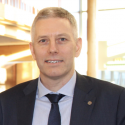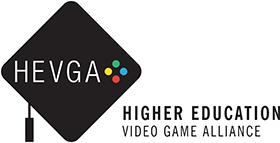HEVGA European Symposium
Day 1: Presentations
| 12:00 Reception is open | Pick up badges. Grab lunch. The campus restaurant / cafeteria is open. |
| 13:00 Presentations start | Room: E48 |
| Mirjam Palosaari Eladhari | Looking at Education |
| Björn Berg Marklund | |
| Robert Brännström | |
| Zdenko Mago, Michal Kabát & Martin Solík | |
| 14:20-14:30 Coffee break | |
| Jenny Brusk | Diversity and Critical Thinking |
| Marge Robam |
|
| Gregory P. Garvey | |
| 15:30-15:45 break | |
| Stephane Muller | Academics and Industry |
| Lissa Holloway-Attaway | |
| Steven Bachelder | |
| Adam Mayes | |
| 17:00 co-co-co combo breaker! | |
| 18:30 Dinner!* | Campus faculty lounge (Room B12) |
Line-up:
13:00 Why I care about Higher Education in Video Games
 by Mirjam Palosaari Eladhari (Senior Lecturer),
by Mirjam Palosaari Eladhari (Senior Lecturer),
Södertörn University
I have been teaching games since 2004. It started as a necessary chore – as part of being a PhD candidate. Over the years it has become – to my surprise – the greatest joy of my working-life. In this talk I outline what has been most amazing, what has been awfully difficult, and what I see as our greatest challenges as educators. I would love for this session to be a start-off for some of the discussions for day 2 in our Symposium. We already give good educations in games – how can we make them even better by supporting each other, and sharing knowledge?
13:20 Scandinavian Game Educations, Past and Present
 by Björn Berg Marklund,
by Björn Berg Marklund,
University of Skövde, School of Informatics
In this presentation, I aim to present the results from a long-term indexing effort I’ve done to keep track of application, enrollment, disciplines, and gender distribution data of academic game educations in Sweden since 2001 and onward. I don’t work under the pretense that I have 100% correct and flawless data, and part of the presentation will discuss the potential problems with the used research method, but I do think it could still provide an interesting backdrop for some discussions or be a good crash course for visitors of how Scandinavian game educations, and in particular Swedish game educations, have grown and changed over the past decades.
13:40 Luleå University of Technology – Passion & Talent
 by Robert Brännström (Head of CS division) Luleå University of Technology
by Robert Brännström (Head of CS division) Luleå University of Technology
Luleå University of Technology has educated game related content for more than 20 years. In this talk I will introduce the 3 current programs: BSc Computer Game Programming, BFA Visual Arts – Digital Design + Film Design. After an introduction to the program syllabus I will talk about the collaboration between the programs and with the industry. In the end I might include a few slides on the Arctic Game Lab initiative.
14:00 The Theory (and Practice) of Digital Games in Slovakia
 by Zdenko Mago, Michal Kabát and Martin Solík at University of Ss. Cyril and Methodius in Trnava
by Zdenko Mago, Michal Kabát and Martin Solík at University of Ss. Cyril and Methodius in Trnava
Currently, the Faculty of Mass Media Communication at the University of Ss. Cyril and Methodius in Trnava significantly contributes to the development of game studies in Slovakia particularly through its unique study program – the Theory of Digital Games. The program offers all bachelors, masters as well as PhD study. After three years of its existence, we have formed many perspective partnerships and cooperations, started several projects related to digital games and game studies in general, and we have even published the first issue of our new scientific journal, Acta Ludologica, focused solely on gaming discourse
14:20 Coffee break
14:30 Gender Inclusive Game Education: Responsibilities and Strategies
 by Jenny Brusk (Senior lecturer)
by Jenny Brusk (Senior lecturer)
University of Skövde
Recruiting more women to the game industry has been an outspoken goal for the Swedish Game Industry for some years now. As game educators it is our responsibility to make sure that we provide equal opportunities for men and women to become game developers, but do we and can we? How can we recruit and retain female to our programs and what responsibility do we have for their future work life? In this talk I will present some of the strategies we have developed within DONNA* since the start 7 years ago at the game development programs in Skövde. I will also give some examples of activities we have organized and present some results of our work. With the presentation I hope to start a discussion on how we can collaborate and support each other in working towards a gender equal game education.
* DONNA is an organization for gender inclusive game development at the University of Skövde. DONNA was initiated in 2011, inspired by the work done by SuperMarit, a project run by the gender institute in Gotland between 2004 and 2010. DONNA is available on the Gotland Game Conference show floor if you want to have a talk with them.
14:50 Challenge life before it challenges you
By Marge Robam
(Head of Curricula), Estonian Entrepreneurship University of Applied Sciences, EUAS Mainor
More and more start-ups and game design studios we will see growing in Estonia. In Estonian Entrepreneurship University of Applied Sciences students get a strong base for entrepreneurship. There is quite small but fast growing game design and development industry. EUAS Mainor Game Design and Development students make a contribution on it with creative ideas and knowledges of design thinking.
15:10 Critical Thinking Through Game Design
 by Gregory P. Garvey (Professor, Director),
by Gregory P. Garvey (Professor, Director),
Quinnipiac University
This presentation argues that calls for a “New Education” should impart 21st century skills–namely critical thinking, design thinking, systems thinking, algorithmic thinking, creativity and soft skills. Learning game design teaches these skills and when coupled with a solid grounding of a liberal education students are better prepared to be responsible citizenship and to compete in the global economy.
15:30 Coffee break
15:45 Professional Esports Management Certificate Program Creation
 by Stephane Muller (EdD)
by Stephane Muller (EdD)
University of California Irvine
University of California Irvine developed the first online Esports Certificate Program with industry expert instructors from Amazon Game Studios, League of Legends and Blizzard Entertainment. The learning outcomes of the 3 courses are:
- Develop an understanding of the history, community, and business of esports and the online gaming industry.
- Plan and execute an esports tournament or event of any scale and scope.
- Improve your communication, problem solving, and project management skills.
- Create a business plan for a team, community event, or any other opportunity geared towards the esports audience.
I shall present the 3 main opportunities and challenges of the creation of this program.
16:00 Developing International Research Projects in Games
 by Lissa Holloway-Attaway (Associate Professor in Media Arts, Aesthetics, and Narration)
by Lissa Holloway-Attaway (Associate Professor in Media Arts, Aesthetics, and Narration)
University of Skövde
For more than 15 years the University of Skövde in Sweden has been growing and transforming its games education. Currently it has a robust and interdisciplinary education with over 600 students studying games across 7 different disciplines. At the Bachelor’s level these include programs in graphics, game writing, sound/music, design, and programing. At the Master’s level these include a program in Serious Games and one in Digital Narratives: Cultural Heritage and Game Technologies. (A new 2-year Master’s in “Games, Stories, and Aesthetics” is in development for 2020 with funding provided by the University Rektor’s Strategic Initiative Program.)
Additionally we have been working to grow our research to maximize the connections between educational programs and research. Our goal is forge connections among faculty at all levels who teach within our programs so that we may collaborate on funded projects, as well as work to build our PhD program and increase our International networks and visibility.
In my talk I will discuss and briefly demonstrate some game-based funded projects within the Media, Technology, and Culture (MTEC) group for which I serve as the research leader. Our goal has been to work in interdisciplinary collaborative research projects that include games, gaming elements, or related research in design and interaction. We currently have several national and international funded projects with multiple partners incorporating games as core elements. These range from work on inclusive game development (with focus on disability and gender), environmental humanities and gaming, cultural heritage games, games and journalism, developing STEM education with games, and games and cultural planning, for example. Funding ranges from regional Swedish sources to multi-partner International EU projects. I will also provide tips for development and lessons learned for collaboration and networking.
16:20 Thoughts on artistic thinking
 by Steven Bachelder (Professor in Artistic Expression)
by Steven Bachelder (Professor in Artistic Expression)
Uppsala University
Artistic thinking as a form of cultural compression and complex and multidimensional logic. This talk is about artistic expression through the creation and playing of games and aims to initiate a discussion based on the following questions:
– What is it that games can do that no other art form can?
– Where do games fall short?
– How do we better support the advancement of games and play as a core component in the advancement of the arts and culture?
This talk examines the role of HEVGA in aiding artistic thinking in our game educations, the connection between art and play and the need for conceptual and structural support for artistic complexity in our educational institutions.
16:40 Game Design: There and Back Again.
 By Adam Mayes (Subject Responsible, Game Design) Uppsala University
By Adam Mayes (Subject Responsible, Game Design) Uppsala University
“It is not enough anymore to design a level of corridors for people to run through and shoot at each other. That is not game design anymore, it is product design.” – Robin Hunicke, at NGC18.
This presentation is a call to arms: As game academics we must lead the public conversation about games as a medium. Not only that, we need to stay on the vanguard of design issues, looking at, talking up, and shaping what games can do.
In this talk I will draw on my recent experience looking at “Game Design and …” The “and” has ranged from social work and therapy, through media literacy and into magic and alchemy. I will discuss how this lead to a growing disillusionment with the game design cul de sac I found myself in and reflect on the signposts that helped me get out.
17:00 co-co-co combo breaker!
~18:30: Symposium Dinner
About the dinner
Uppsala University and the Department of Game Design invites to a buffét-style dinner with local delicacies. The dinner will take place in our surprisingly cozy faculty lounge on Campus Gotland and includes the government-approved number of drinks (= 2 glasses of wine / beer or non-alcoholic). To prevent a sub-par lounging experience we’ll also provide drinks for purchase. This will be cash only, probably 20kr or so for a drink. Please bring change or (for the Swedes) be prepared to Swish. 🙂
There will be plenty of vegan and vegetarian options too.


